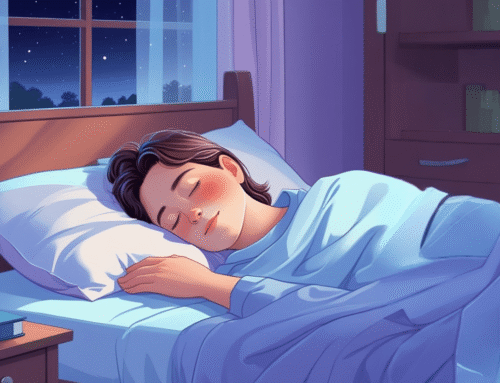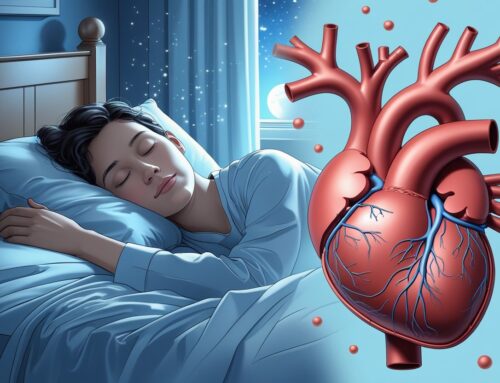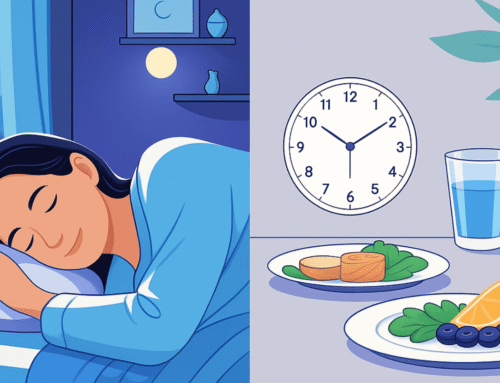Sugar affects sleep in different ways. Eating too much sugar, especially before bed, can make it harder to fall asleep. It can also reduce the quality of sleep. Blood sugar levels influence sleep, and poor sleep can change how the body handles sugar. Eating sugary foods late in the day can cause lighter sleep and more awakenings during the night. This can lead to stronger sugar cravings the next day, creating a cycle that affects health. Paying attention to when and how much sugar is eaten can help support better sleep and keep blood sugar stable.
Knowing how sugar and sleep interact can help improve energy and well-being. Simple adjustments in diet and daily habits can support better rest without drastic changes.
Key Takeaways
- Sugar intake can interfere with falling asleep and sleep quality.
- Eating sugar late in the day leads to sleep disruptions.
- Managing sugar helps improve sleep and regulate blood sugar levels.
- A supportive and comfortable mattress promotes uninterrupted, deep sleep, which helps regulate blood sugar and supports overall metabolic health.
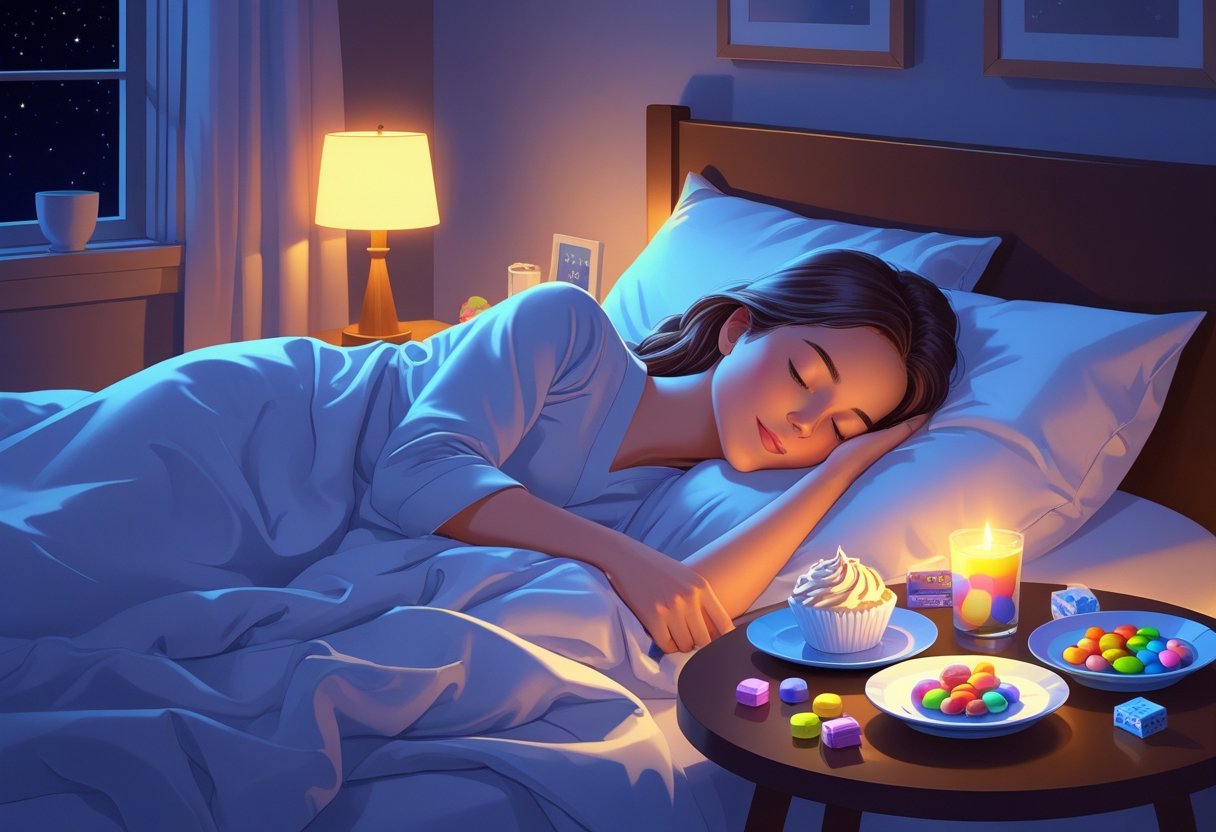
Does Sugar Affect Sleep?
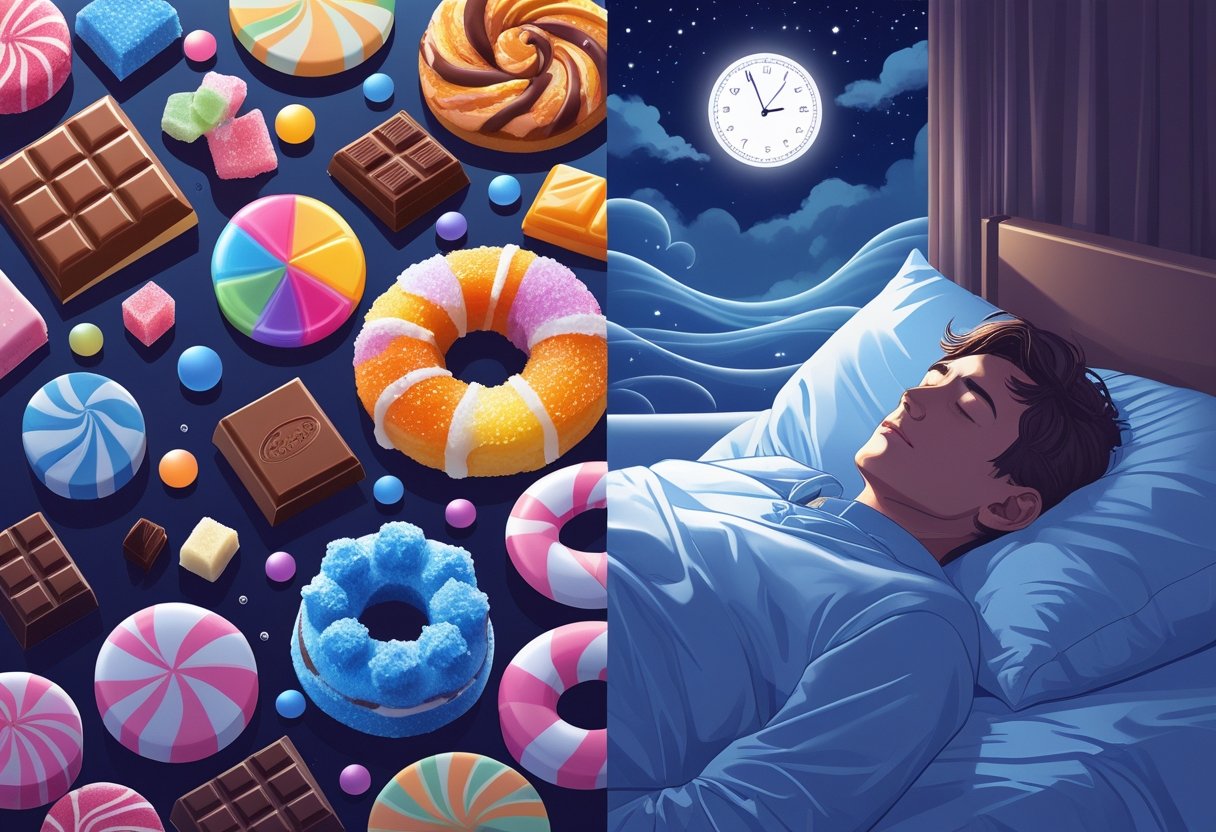
Sugar can change how well a person sleeps by altering the natural rhythm and quality of sleep. It affects certain hormones and brain chemicals that control sleep patterns. This can make it hard to fall asleep or stay asleep through the night. Over time, it can also make sleep feel less restorative.
How Does Sugar Impact the Sleep Cycle?
Sugar slows down the release of melatonin, the hormone that tells the body to get ready for sleep. Without enough melatonin, it is harder to enter deep sleep phases. Eating too much sugar, especially close to bedtime, can interrupt the stages of the sleep cycle. Sugar causes blood sugar to rise quickly and then drop, which can wake the body during the night. This can reduce the time spent in deep, restorative sleep. Actually, even small amounts of sugar before bed can affect sleep quality.
Disrupted sleep also affects other hormones like cortisol and insulin. High sugar intake can create a cycle of poor sleep and hormone imbalance. Over time, this can impact overall health and make it more difficult to rest properly.
Is Sugar Linked to Insomnia?
Yes, high sugar consumption can contribute to insomnia, where people struggle to fall or stay asleep. Sugar triggers inflammation and hormone swings that increase alertness when the body should be winding down. People who eat sugar regularly can experience repeated sleep interruptions and increased hunger. This creates a cycle that is hard to break and can lead to ongoing sleep problems.
Insomnia caused by sugar may get worse with time. Those who eat more sugar might notice it takes longer to fall asleep and they wake up more often at night. Reducing sugar can gradually improve the quality of sleep.
Does Sugar Keep You Awake or Make You Sleepy?
Sugar can either keep a person awake or make them feel drowsy, depending on timing and amount. Right after eating sugar, the quick energy spike can increase alertness. This can delay sleep if sugar is eaten too close to bedtime. After the spike, blood sugar can crash. This drop may make someone feel sleepy, but the sleep is usually not deep or restful. It can lead to waking up during the night or feeling tired soon after sleeping.
Eating sugar earlier in the day is less likely to cause sleep problems. But consuming a lot of sugar before bed tends to disrupt the natural sleep-wake cycle. Cutting back on sugar in the evening supports more stable and restful sleep. For more details on how sugar impacts sleep, see this article on Sugar’s Impact on Sleep.
Sugar Consumption Before Bed
Eating sugar close to bedtime can cause changes in the body that affect rest. The timing and amount of sugar you eat can change how easily you fall asleep and how well you sleep. Effects range from short bursts of energy to disruptions that last through the night.
Effects of Eating Sugar at Night
Eating sugar at night raises blood sugar quickly. That spike gives a short burst of energy, which can make it hard to relax. Soon after, blood sugar can drop sharply, and the body may release stress hormones like adrenaline. These shifts can create feelings of anxiety or restlessness. For some, these ups and downs make it harder to fall asleep or cause waking in the middle of the night. Eating a lot of sugar before bed can also increase inflammation and disturb natural sleep rhythms.
Does Sugar Interfere with Falling Asleep?
Sugar before sleep can increase alertness because of the quick energy boost. This keeps the brain active at a time when it should be calming down.
Effects vary from person to person, but for many, sugar late at night makes falling asleep harder. Fluctuations in glucose and insulin can interrupt the body’s natural winding-down process. Combining sugar with caffeine can make this effect stronger.
Does Sugar Before Bed Lead to Poor Sleep Quality?
Eating high amounts of sugar before bed is linked to interrupted sleep and less deep sleep. Research shows people who eat a lot of added sugar are more likely to wake up during the night. Poor sleep can reduce time in slow-wave and REM sleep, which are important for recovery and memory. Studies suggest that people who consume more sugar at night have roughly 3.5 times higher risk of low-quality sleep than those who eat less sugar. More details on sugar’s effect on sleep can be found in studies linking added sugar intake to sleep quality.
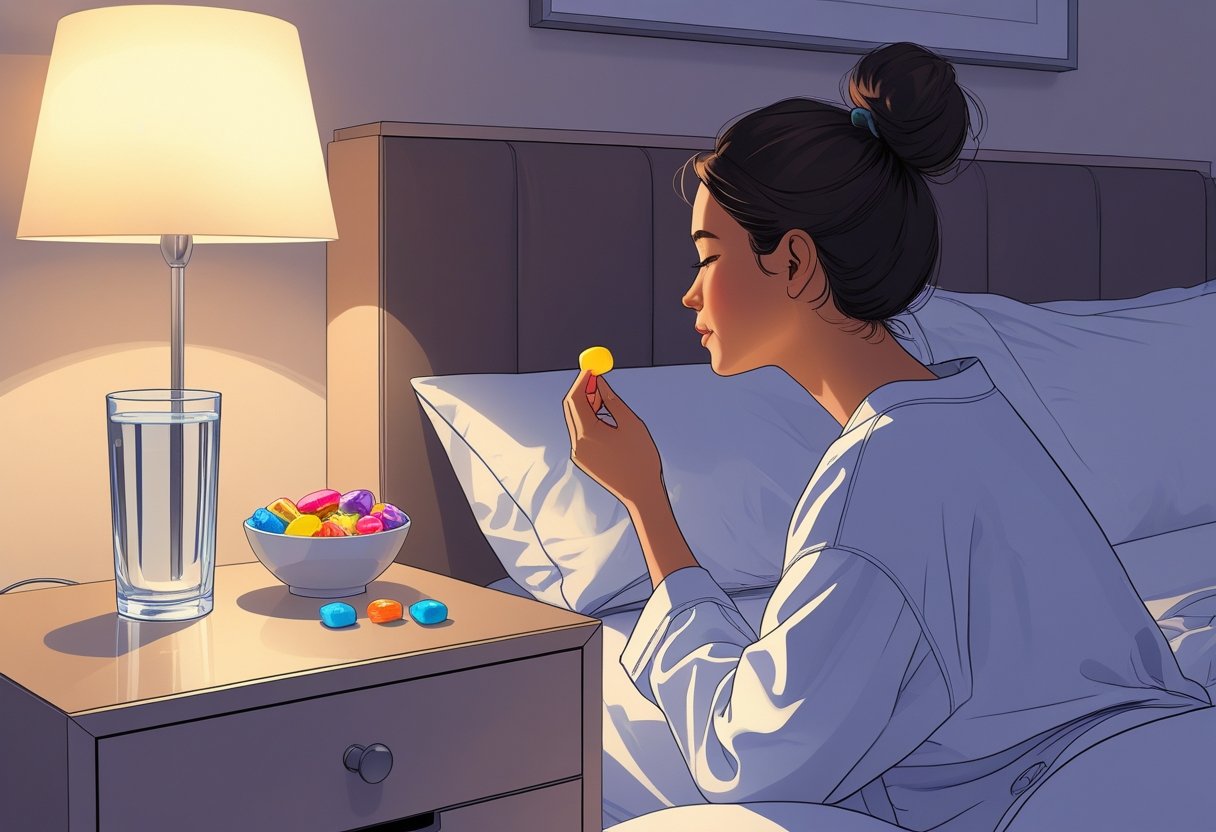
How Sugar Influences Sleep Quality
Sugar intake can change how the body moves through different stages of sleep. It can change how long someone stays in deep sleep or REM sleep, which are key for feeling rested. Eating a lot of sugar may cause disruptions that lower overall sleep quality.
Sugar and Sleep Architecture
Sleep architecture is the pattern of sleep stages a person goes through each night. Eating a lot of sugar, especially added sugars, can change this pattern. Studies show high sugar intake can lead to more awakenings and less time in the sleep stages that restore the body. Sugar causes blood sugar levels to rise and then fall, which can wake a person up. This fluctuation interrupts the natural flow of sleep, making it lighter and more broken up. When sleep is fragmented, the body can’t fully recover, leaving a person feeling tired the next day.
Does Sugar Disrupt Deep Sleep?
Deep sleep is the stage when the body repairs itself and strengthens organs and muscles. Sugar can reduce the time spent in this stage. High blood sugar before bed can stimulate the nervous system, making it harder to reach deep, restorative sleep. People who eat a lot of added sugar may take longer to fall asleep and spend less time in deep sleep. This can affect recovery, immunity, and hormone balance. Lower deep sleep caused by sugar can also increase the risk of insulin resistance over time.
Impact on REM and Restfulness
REM sleep supports memory, mood, and emotional health. Too much sugar can shorten REM sleep or make the cycles less predictable. This leads to less restful sleep and can cause fatigue and trouble focusing.
Sugar can increase restlessness and the chances of vivid dreams or nightmares. These effects reduce how satisfying sleep feels, even if the total hours seem enough. Cutting back on sugar, especially before bed, can help keep sleep cycles steady and improve how refreshed a person feels. For more details on sugar’s effects on sleep, see this article on the relationship between added sugar intake and sleep quality.
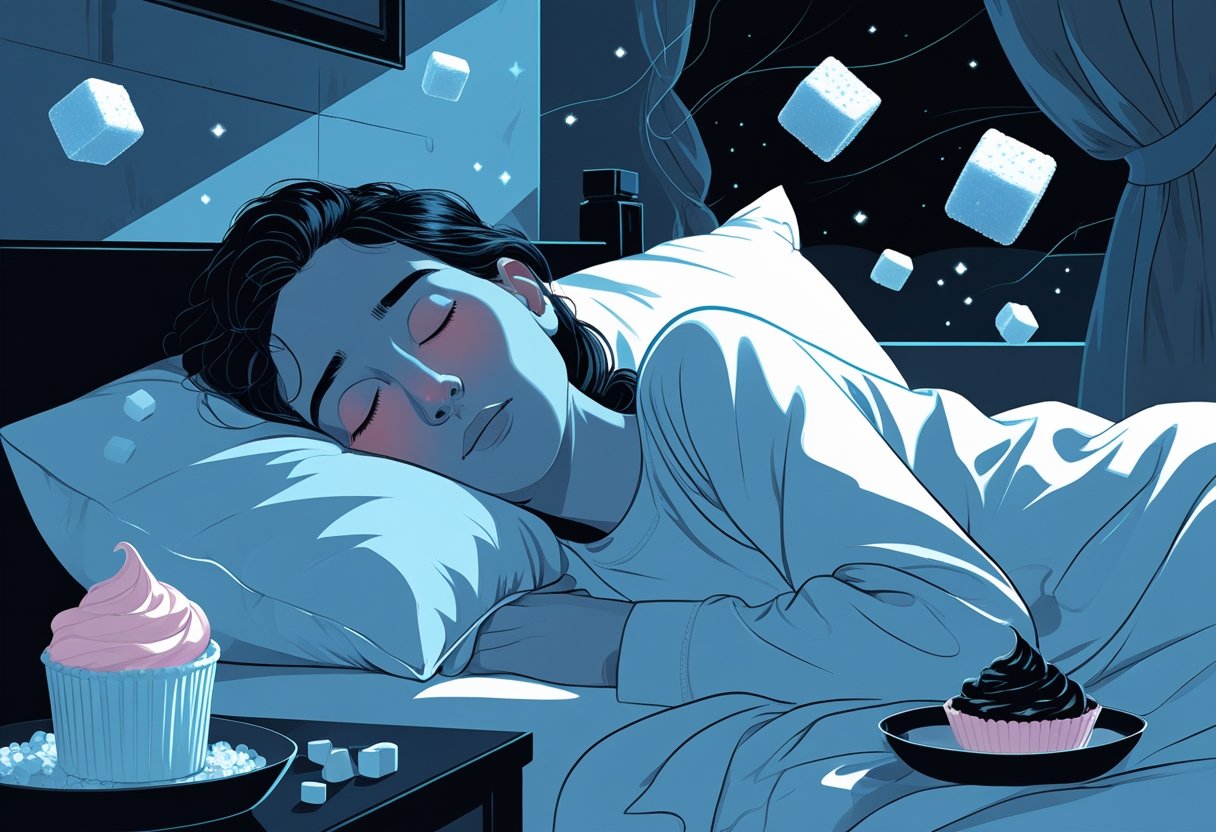
Blood Sugar Fluctuations and Sleep Health
Blood sugar levels can change throughout the night and directly impact sleep quality. Both high and low blood sugar can cause restlessness, awakenings, and difficulty falling asleep. Hormones involved in glucose control also affect sleep patterns, linking blood sugar and rest in a complex way.
High Blood Sugar and Sleep Disturbances
High blood sugar, or hyperglycemia, often causes frequent urination and increased thirst. These symptoms can wake a person multiple times at night, disrupting sleep cycles. Elevated glucose levels can also lead to discomfort, headaches, and a general feeling of restlessness. This makes it harder to fall asleep and stay asleep through the night.
Long-term high blood sugar may worsen sleep problems such as obstructive sleep apnea. People with type 2 diabetes often face these challenges because insulin resistance affects the body’s ability to regulate glucose and hormones critical to sleep.
Low Blood Sugar Effects on Sleep
Low blood sugar, or hypoglycemia, can trigger night sweats, trembling, and a racing heart. These reactions can wake a person suddenly and cause difficulty returning to sleep. Hypoglycemia also raises stress hormones like adrenaline, which can increase alertness and keep someone awake. This response can make sugar a stimulant in some cases, counteracting natural sleepiness.
The time sugar keeps someone awake depends on how fast blood sugar drops and the body’s sensitivity to insulin. Sudden blood sugar falls often cause restless or light sleep, damaging overall sleep quality.
Hormones Linking Blood Sugar and Rest
Several hormones connect blood sugar control and sleep quality. Insulin helps cells absorb glucose, and its sensitivity drops with poor sleep, raising the risk of blood sugar swings. Cortisol, a stress hormone, increases when blood sugar is unstable or sleep is poor. High cortisol reduces insulin effectiveness and can prolong wakefulness at night. Growth hormone, released mainly during deep sleep, supports glucose metabolism. Disrupted sleep reduces growth hormone secretion, causing imbalance in blood sugar control.
These hormonal shifts explain why sugar intake, sleep problems, and blood sugar levels affect each other directly. Managing blood sugar can improve rest, while good sleep supports balanced hormone function. For more on this connection, see the detailed discussion of sleep and blood sugar levels from Sleep Foundation.
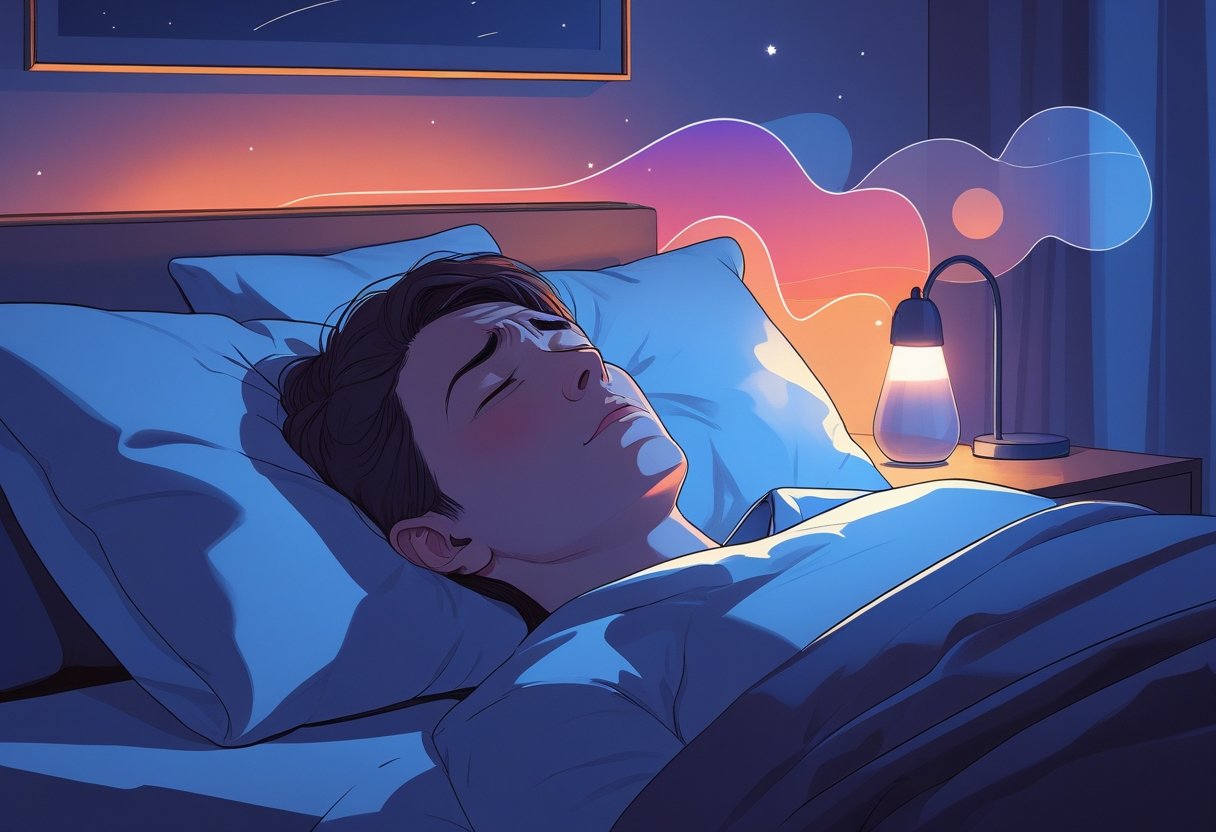
Sleep Deprivation and Sugar Cravings
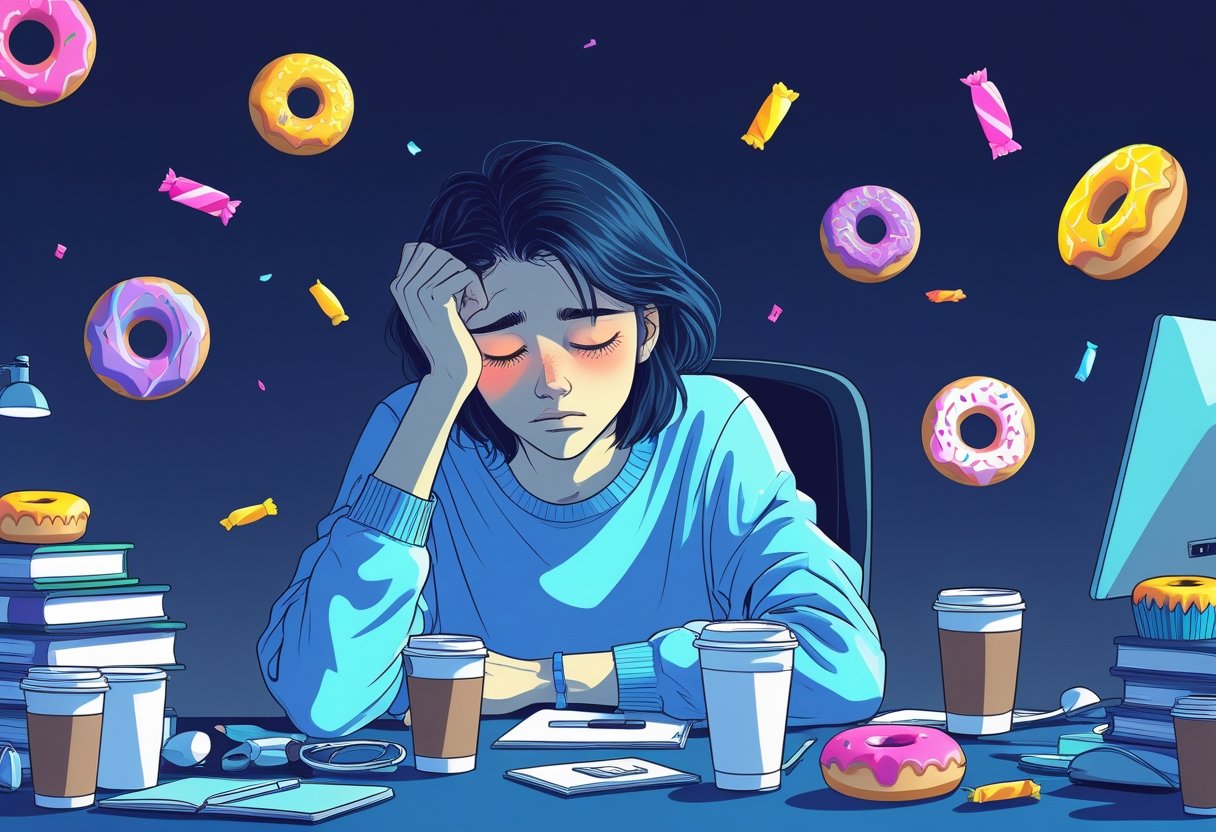
Lack of sleep changes how the body manages blood sugar and hormones. It also affects cravings and food choices, leading to higher sugar intake and preference for less healthy foods.
Can Poor Sleep Increase Sugar Intake?
When sleep is limited, the body produces more cortisol, a stress hormone that can trigger sugar cravings. High cortisol makes insulin less effective, which can make blood sugar harder to control. This can push someone to reach for quick energy foods, like candy or sweet drinks. Being tired also lowers energy. Feeling drained encourages eating foods high in sugar and fat to get a quick boost. This can increase calories and cause blood sugar spikes the next day.
Eating sugar before bed doesn’t improve sleep. High sugar intake at night can lead to restless sleep and make mornings feel even harder. Keeping blood sugar steady during the day helps avoid this cycle.
How Sleep Loss Alters Food Choices
Sleep affects brain areas that control food decisions. Lack of rest reduces activity in self-control areas and increases signals tied to pleasure from eating. This shift can make high-calorie, fatty, or sweet foods more appealing. Salted snacks may also feel more tempting. Hormones that manage hunger, like leptin and ghrelin, also get out of balance. Ghrelin rises, increasing hunger, while leptin falls, reducing fullness.
These changes push people toward foods that spike blood sugar and fuel cravings, creating a cycle of poor sleep and unhealthy eating. For more on how sleep deprivation affects sugar cravings and food choices, see the detailed study on sleep deprivation’s effects on glucose and cravings.
Strategies for Better Sleep and Balanced Sugar Intake

Managing sugar intake and adopting healthy habits can improve sleep quality significantly. Knowing what to eat and when, along with making changes to daily routines, helps keep blood sugar steady and supports restful sleep.
Tips for Healthy Nighttime Eating
Eating late at night can affect blood sugar and sleep. Avoid foods and drinks with a lot of added sugar before bed. They can cause spikes followed by crashes, which may lead to restless nights. Drinking water instead keeps glucose levels steady and prevents waking up thirsty.
Snacks with protein, fiber, and healthy fats help keep sugar levels steady. Try a small handful of nuts, plain yogurt, or fruit with nuts. Eating balanced meals throughout the day also helps control blood sugar.
Promoting Stable Blood Sugar for Restful Sleep
Stable blood sugar lowers the chance of waking at night and supports longer sleep. Spreading carbohydrate intake evenly through the day prevents big swings in sugar levels. Limiting added sugar to under 10% of daily calories is helpful. Eating too much added sugar is linked to shorter sleep and trouble staying asleep.
Caffeine near bedtime can make sleep harder and raise blood sugar. Many find that keeping sugar balanced helps them fall asleep faster and stay asleep longer.
Lifestyle Changes for Improved Sleep Quality
Regular exercise helps regulate blood sugar and supports sleep by making the body naturally tired. Finish workouts a few hours before bed to avoid feeling too alert. Managing stress with deep breathing or meditation reduces the effect of sugar on sleep. Stress can trigger cravings for sugary foods, so managing it keeps sugar levels steadier. Keeping a consistent sleep schedule with at least 7 hours of rest helps maintain stable blood sugar. A routine signals the body when it’s time to sleep, lowering nighttime sugar dips or spikes.
More tips on improving sleep and sugar balance can be found at Sugar and Sleep and How Sleep Affects Your Blood Sugar.
How the Right Mattress Supports Sleep and Sugar Balance
A mattress that offers proper support and comfort is key to restful sleep. Sleeping well helps your body manage blood sugar. Poor sleep increases stress hormones like cortisol, which can raise glucose levels. A mattress that lets you sleep without interruptions supports a healthier metabolism.
Look for these features:
- Firmness that keeps your spine supported
- Temperature control to prevent overheating
- Pressure relief to reduce tossing and turning
These features help you sleep longer and reach deeper sleep stages. Deep sleep improves insulin sensitivity, which helps control blood sugar.
Not getting enough quality sleep can lead to insulin resistance and raise the risk of diabetes. Choosing a mattress that supports both comfort and rest is an important step for your health. If you want an upgrade, the Helix Midnight Luxe Mattress is worth considering. It has medium-firm support, which works for most sleeping positions. The mattress has a quilted pillow top and multiple foam layers that relieve pressure and keep your spine aligned. The breathable Tencel cover helps regulate temperature.

Frequently Asked Questions
Sugar can affect sleep in different ways. It can change how fast you fall asleep, the depth of your sleep, and the balance of sleep stages like REM and deep sleep. The type of sugar and when you eat it also matter.


